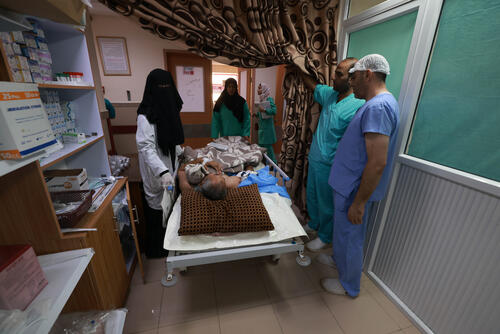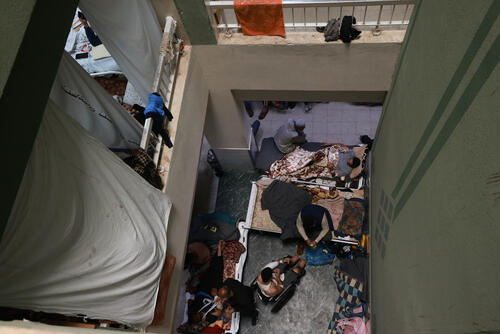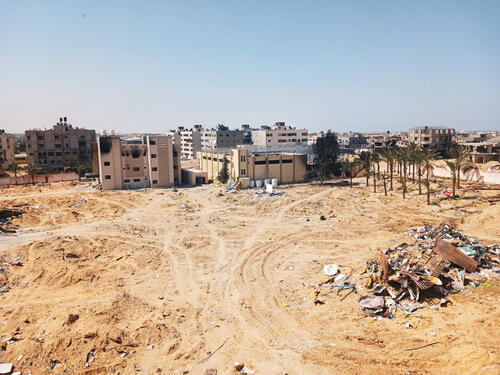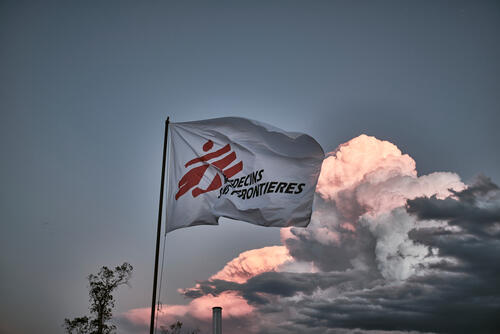Since the fragile truce in the Gaza Strip, Palestine, collapsed on 1 December, aerial and ground attacks by Israeli forces have resulted in hundreds of people killed and injured. Two hospitals supported by Médecins Sans Frontières (MSF) – Al-Aqsa in the Middle Area and Nasser in the south of the Strip – where MSF Palestinian and international staff are working and living, are barely able to cope with the influx of patients.
“We hear bombing around us, day and night,” says Katrien Claeys, MSF team leader in Gaza’s Middle Area, where MSF teams support local health workers in treating people with blast injuries and burns. “In the last 48 hours, over 100 dead and over 400 injured people arrived at the emergency room of Al-Aqsa hospital. Some patients were taken in for surgery right away.”
When injured patients overflow the hospital, services treating people whose conditions are not immediately life-threatening must be deprioritised.
Almost two million people are left without options. The only solution is an immediate and sustained ceasefire and the unrestricted supply of aid to the entirety of the Gaza strip.Chris Hook, MSF medical coordinator in Khan Younis
“We see patients with signs of infection and necrotic tissue, as they have not received a change of wound dressing in days and sometimes weeks,” says Claeys.
MSF teams have set up a temporary wound dressing unit within Al-Aqsa hospital to provide treatment to patients with chronic wounds, or injuries from domestic accidents or previous attacks.
Nasser hospital, in Khan Younis, where MSF teams provide surgical care to patients with trauma and burn injuries, is now at breaking point due to the continuous influx of new patients.
“The hospital has been receiving multiple severely injured patients nearly every hour,” says Chris Hook, MSF medical coordinator in Khan Younis. “With the situation as it is in the hospital – there is no available space anymore – it really is a terrible situation. Everyone is genuinely worried about what will come next.”

Israeli forces order civilians in the south to move again
As Israel’s aerial and ground offensives move south, people in some neighbourhoods in the Middle Area and Khan Younis have been ordered to evacuate further south, towards Rafah, along the Egyptian border. We have had to suspend our medical support to Martyrs and Beni Suhaila clinics, as they are located in areas under the evacuation order.
“Every day, Israeli authorities order a new neighbourhood to evacuate, asking people to move to another city, further and further south,” says an internally displaced member of MSF staff in Khan Younis. “Even during the truce, people were not allowed to go back north to their homes. Only three or four neighbourhoods remain accessible and all of them are overcrowded.”
The majority of the 1.8 million internally displaced people in the Strip have sought shelter in the south of Gaza, where they currently live in appalling conditions. Many civilians have already been displaced several times since 7 October. They have nowhere to go to, as nowhere is safe.
With the situation as it is in the hospital – there is no available space anymore – it really is a terrible situation.Chris Hook, MSF medical coordinator in Khan Younis
Gaining access to essential services, including healthcare, has become extremely challenging for people in the south of Gaza. Tight movement restrictions, imposed by the Israeli forces and ongoing heavy shelling and bombing, prevent people from seeking medical help in time, while also hindering our teams’ capacity to respond.
Back in Nasser hospital, the number of displaced people has markedly increased again since last Saturday, with new shelters being set up in every corner of the car park. Many people are sleeping on the floor next to the medical facility.
“In a military campaign that has lasted weeks, with only a brief respite, the speed and scale of the bombing continue to plumb the depths of brutality”, says Hook. “Almost two million people are left without options. The only solution is an immediate and sustained ceasefire and the unrestricted supply of aid to the entirety of the Gaza strip.”






